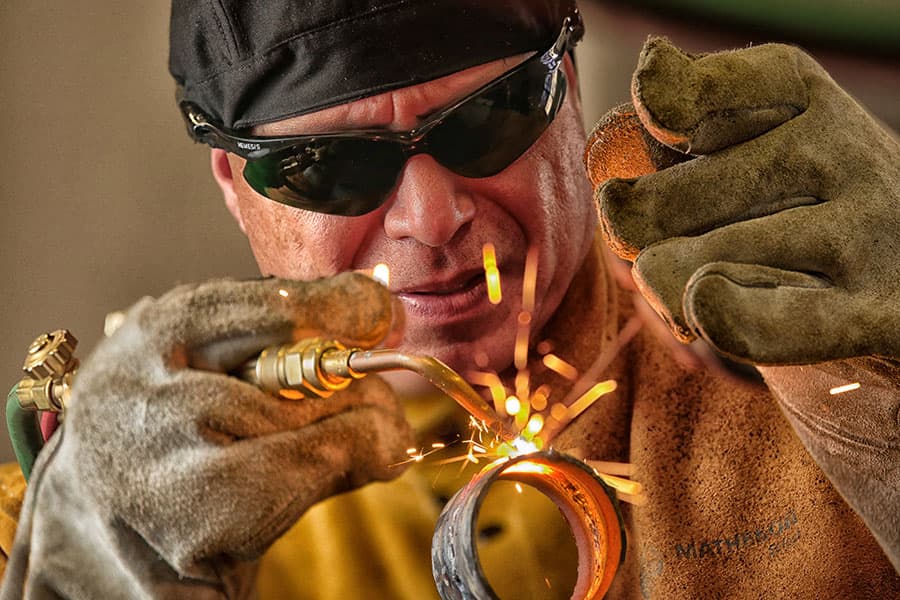Workers in the HVAC field often have to worry about several types of certifications to find success. HVAC technicians may need to get a state license or a product certification to show their knowledge and skills. A key component of a successful career in HVAC is having an EPA license. The federal government mandates EPA 608 certifications for those who work in certain aspects of HVAC. Here is everything you need to know about this type of certification and whether or not you need one.
Details About the EPA 608 Regulation
This type of certification refers to section 608 of the federal Clean Air Act, which was passed in 1970. The Environmental Protection Agency governs this aspect of the HVAC industry and mandates several things related to working on, repairing, maintaining, installing, and removing appliances that have refrigerants. The aim of section 608 in the Clean Air Act is to prevent harmful chemicals from refrigerants from damaging the Earth’s ozone layer.
Some chemicals used in refrigeration, such as halons, chlorofluorocarbons, and hydrochlorofluorocarbons, may contribute to the hole in the ozone layer. Additionally, research has linked chemical refrigerants to emitting greenhouse gasses and causing climate change.
Section 608 was added to the law in 1993 to help protect the planet and reduce the damage refrigerants were causing to the environment. Now, technicians who work with appliances that use refrigerants are required to have EPA 608 certification. This certification and the regulations associated with section 608 ensure that appliances are repaired and disposed of safely and appropriately.
Different Types of Certifications in HVAC
HVAC professionals who need this certification must also determine the specific type that matches their line of work. EPA 608 certification is classified into four different kinds. Each type of EPA 608 certification allows the HVAC professional to work with certain appliances.
Type I – Type I EPA 608 licenses allow HVAC workers to service only small appliances. Small appliances are designated as those that use factory-sealed refrigerants of five pounds or less. To be certified, candidates must demonstrate knowledge of the safety and recovery of refrigerants in smaller appliances, often residential appliances.
Type II – The Type II EPA 608 certification is for jobs that involve repairing, servicing, or disposing of high-pressure appliances. Those with this certification are not qualified to repair, service, or dispose of small appliances or air conditioning systems in a motor vehicle. Professionals with this certification are expected to know how to find a refrigerant leak and repair it safely. They are also experts in safely disposing of high-pressure appliances with refrigerants. In some cases, this may include commercial equipment. High-pressure appliances include commercial refrigerators, heat pumps, split-system residential air conditioners and refrigeration systems for grocery stores.
Type III – Type III EPA 608 licenses allow HVAC workers to focus on low-pressure appliances. It requires expertise with leak detection and fixes, disposal of refrigerants, safety, and recovery techniques. Some low-pressure appliances use nitrogen, so technicians need to have extensive knowledge about this chemical.
Universal – For HVAC technicians who work with all types of appliances and air conditioning systems, it’s recommended to get universally certified. A universal certification demonstrates that the candidate has passed all three types of EPA 608 exams and has the skills needed to safely service and dispose of any kind of appliance with refrigerant.
How To Prepare for Certification
It’s important to prepare adequately for an EPA 608 certification exam. Generally, most people start with some knowledge and experience in the HVAC field. One option that may fast-track someone to becoming certified and skilled in working with heating and air conditioning systems is to enroll in a career preparation program for HVAC.
At Summit College, there is a complete program for HVAC technicians. This program prepares students for success in the field. The program features courses in residential and commercial HVAC, heating technology, environmentally-friendly HVAC practices, system design, and refrigerants.
Graduates of the program are prepared to take the exam for EPA 608 certification. They are also equipped to pass the industry’s standard certification exams and transition into a fulfilling career in HVAC service.
Take the Test
Once you feel ready to take the test, it’s easy to find possible testing locations in person or online. You’ll need to find an EPA authorized testing vendor and then make an appointment for the exam. If you aim to get the universal certification, it’s best to plan out your testing strategy to obtain more than one certification.
In addition to taking each certification type for the EPA 608 license, candidates must also pass the Core knowledge test. The Core exam tests basic knowledge about the impact on the environment of refrigerants and other chemicals as well as details of the Clean Air Act. Safety, shipping, recovery, reclaiming, and recycling of appliances is also covered in the first core section.
Before going in for the exam, it’s best to take time to review topics and take some practice tests online to test your knowledge. Additionally, be sure to find out if your test is open book or proctored. Each of the tests is 25 questions. To pass each Type, you must earn at least 21 out of 25.
The Cost of Certification
Many people wonder, how much does it cost to get EPA certified? The cost of getting the EPA 608 certification varies, depending on which test you take and what kind of preparation program you opt for. The lowest-priced certification exam is the Type I, which can be priced as low as $20 in some cases. Type II and Type III certification exams may be required to be administered in person and with a certified proctor, which could raise the price.
Get More Opportunities
Companies that hire HVAC technicians for their service team typically require EPA 608 certification. The best jobs in complex commercial HVAC also may have a prerequisite of being EPA certified. HVAC professionals who are serious about their careers and want to demand top salaries should consider getting a certification.
If you want to learn more about preparing yourself for a career in HVAC and getting the EPA 608 certification, check out Summit College’s HVAC program. Summit’s job training prepares you to experience a successful career in HVAC.
Video: https://www.youtube.com/watch?v=bw32wl5QMYc&feature=emb_logo
Tags: hvac, hvac system, refrigerants



